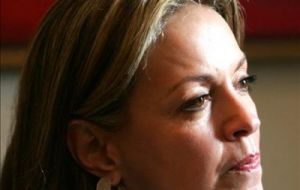MercoPress. South Atlantic News Agency
Unasur splits two-year Secretary General post between Colombia and Venezuela
 Colombia’s Emma Mejia will become Secretary General and for twelve months next April
Colombia’s Emma Mejia will become Secretary General and for twelve months next April Foreign Affairs ministers from the Union of South American Nations, Unasur, gathered in Ecuador Friday for their first meeting as a legally constituted organization agreed on the names to fill the post of Secretary General, vacant since the death of former Argentine President Nestor Kirchner.
Colombia’s former Deputy Foreign Secretary Emma Mejía will be occupying the post for the next twelve months beginning April, while Venezuela’s Minister of Electricity Ari Rodriguez will hold the post on the following twelve months.
Ms Mejía thanked Unasur members her naming as the new secretary general and underlined the significance of succeeding an emblematic figure such as the former Argentine president Kirchner.
“I am most thankful to the eleven countries that unanimously have decided to re-establish through the organization’s Secretariat, the replacement for a man that has proved so emblematic as was the former Argentine leader Nestor Kirchner”, said Ms Mejia in her first statements from Bogotá.
Following her naming for the job Ms Mejia met with Colombian president Juan Manuel Santos in Casa de Nariño, Colombia’s Government House.
Ms Mejia a former Foreign Affairs official and an expert in International Law and social inclusion is scheduled to take office next April.
The second half of the two year mandate of the Secretary General will be completed by the other candidate for the job, Venezuela’s Ari Rodriguez.
Unasur was officially launched in Brasilia in 2008 but only managed to become effective a month ago when the Uruguayan parliament approved the constitution charter, the ninth member in doing so as requested by the original statutes.
The decision to have the two candidates share the two year mandate sends a strong unity message and avoids a painful political confrontation between two neighbour countries that until a year ago were undergoing a serious deterioration of bilateral relations.
Unasur member countries includes: Argentina, Bolivia, Brasil, Chile, Ecuador, Guyana, Peru, Paraguay, Surinam, Uruguay, Venezuela and Colombia. Only Paraguay and Brazil still have to approve the founding charter.




Top Comments
Disclaimer & comment rules-

-

Read all commentsA strike of political and diplomatic geniality…..
Mar 12th, 2011 - 08:56 am 01 year to la “Monita”
1 year to Ali……………………..
A very good day for Unasur :-)
”Venezuela’s Minister of Electricity Ari Rodriguez will hold the post (UNASUR Secretary General) for the following twelve months.”
Mar 12th, 2011 - 05:09 pm 0As one of the non-aligned states - not-Mercasur, not- Andean Community of Nations (CAN), Venezuela has a free hand to develop South America in its own image. I hope the Continent has a strong stomach!
BACKGROUND: UNASUR
As of November 2010, UNASUR groups have been working on Financial Integration, the World Drug Problem, Infrastructure and Planning, Culture, Education, Science, Technology and Innovation, Social Development, Defense, Energy, Health, Disputes Settlement. Progress is slow, to say the least.
The South American Single Market, beginning with the elimination of tariffs for non-sensitive products by 2014, and for sensitive products by 2019, is to be developed through the convergence of Mercosur and CAN procedures.
Economic development: Presidents of the founding countries - Argentina, Bolivia, Brazil, Ecuador, Paraguay, Venezuela and Uruguay - launched the South American Bank in Buenos Aires in December 2007. The capital will be US$7b, with Venezuela responsible for US$3b (!) and Brazil US$2b. The headquarters will be located in Caracas with offices in Buenos Aires and La Paz. The Bank of the South (a bit like the World Bank) will finance economic development projects to improve local competitiveness, to ‘reinforce integration’, to ‘reduce asymmetries’, to ‘promote egalitarian distribution of investments’, and to promote the scientific and technological development of the member states.
Wrt. Defence policy, the South American Defence Council (CDS), will be responsible for regional security, military co-operation and regional defence. Not a NATO-like alliance, but ‘a cooperative security arrangement, enhancing multilateral military cooperation, promoting confidence and security-building measures, and fostering defense industry exchange’. Even Colombia, with its USA ‘Plan Colombia’ programme, has signed up. Re-arming the conti
Commenting for this story is now closed.
If you have a Facebook account, become a fan and comment on our Facebook Page!